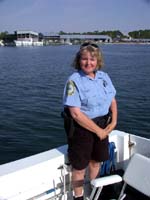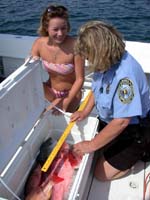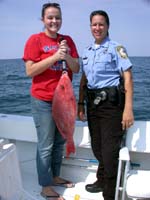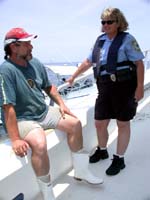
|
Features
|
|
|
|
Books
|
|
|
|
Fun & Games
|
|
|
|
Contact Us
|
|
|
John's Journal... Entry 251, Day 4
FISH COPS: THE WATCHDOG OF THE MARINE RESOURCES
Lady Fish Cops
 Editor's
Note: As you know, salt-water fishing has a number of size limits, bag
limits and restrictions. But do you know who enforces these laws? Who
keeps the commercial fishermen, the netters, the oystermen and the recreational
fishermen from breaking the law, taking too many fish and/or fishing in
closed areas? In my home state of Alabama and many other states, the Enforcement
Division of the Marine Resources Department of the state's Department
of Conservation and Natural Resources (DCNR) has this responsibility.
To learn more about who the fish cops are, what they do, and why they
are important to all of us, I went on patrol with them in coastal areas
recently at night and during the day. I learned that they have some of
the most-sophisticated surveillance equipment of any law enforcement agency.
Besides radar, they have night-vision binoculars and other devices to
spot and track law violators. They also do drug enforcement, health-department
enforcement and immigration enforcement and are cross-trained with many
state and federal agents. This week we'll meet Alabama's fish cops, the
Alabama Marine Resources Enforcement Division (AMRED), and learn what
they do.
Editor's
Note: As you know, salt-water fishing has a number of size limits, bag
limits and restrictions. But do you know who enforces these laws? Who
keeps the commercial fishermen, the netters, the oystermen and the recreational
fishermen from breaking the law, taking too many fish and/or fishing in
closed areas? In my home state of Alabama and many other states, the Enforcement
Division of the Marine Resources Department of the state's Department
of Conservation and Natural Resources (DCNR) has this responsibility.
To learn more about who the fish cops are, what they do, and why they
are important to all of us, I went on patrol with them in coastal areas
recently at night and during the day. I learned that they have some of
the most-sophisticated surveillance equipment of any law enforcement agency.
Besides radar, they have night-vision binoculars and other devices to
spot and track law violators. They also do drug enforcement, health-department
enforcement and immigration enforcement and are cross-trained with many
state and federal agents. This week we'll meet Alabama's fish cops, the
Alabama Marine Resources Enforcement Division (AMRED), and learn what
they do.
There are two female officers in the ranks of AMRED - Audrey Collier and Heidi Lofton.
I PHILLIPS: Why did you decide to transfer to the Enforcement
Division?
COLLIER: When Enforcement Officers came into the office, I started asking
them to let me go out with them on patrol to see what they did and how
they did it to have a better understanding of how their jobs related to
the Resources Department. When I started riding on the boats and helping
the Enforcement Officers, I just fell in love with the job. So I took
the test, became qualified, and I've enjoyed this work ever since.
 PHILLIPS:
Audrey you're in your late 40's and very enthusiastic about your job.
What do you like about being an Enforcement Officer?
PHILLIPS:
Audrey you're in your late 40's and very enthusiastic about your job.
What do you like about being an Enforcement Officer?
COLLIER: I like being out on the water every day that I am working, and
I like knowing that because of me and the other Officers we are helping
to protect all that is Marine Resources for the future. I like the idea
that because of me and my fellow officers my children and grandchildren
will have salt-water fish to catch, oysters to dig and shrimp to net well
out into the future.
PHILLIPS: What is a typical day's work like?
COLLIER: We never have a typical day. We plan our work hours and our shifts
around whatever is in season and the type of violations that we need to
be looking for. We check oystermen, fishermen, netters and commercial
fishermen. We check anyone who is taking any resource out of the Gulf,
and/or the waters that feed the Gulf. In a day at work I will board several
fishing boats and check length limits, creel limits and safety equipment.
I'll also be making sure that if there are any children on-board, they
have on personal flotation devices. In that same day, I may check an oyster
fisherman, a shrimp boat and a commercial snapper boat to make sure there
are no violations.
 PHILLIPS:
What is one of the most unusual days you have had at work?
PHILLIPS:
What is one of the most unusual days you have had at work?
COLLIER: One night my partner and I were checking netters during roe mullet
season in the Fowl River. We waited to see if this netter would set out
a net. Then he didn't and started motoring up the river with his lights
off. When we throttled up the motor to go check him, he throttled down
and started running his boat away from us. As we gave chase, the netter
turned his boat around and rammed our boat. He rammed our boat several
times before he finally ran his boat aground and started running. We gave
chase and finally caught him.
PHILLIPS: What was being rammed like?
COLLIER: I was holding the big spotlight on the suspect while my partner
was driving the boat. When the boat hit us, the collision happened so
quickly, I just thought, "Oh, my God. What's going to happen next?"
because both boats were sideways. I wondered if the suspect was going
to stop or if he was going to continue to try to turn us over. Finally,
when he headed for the bank, our boat ran over the top of the back of
his boat, disabling his boat and causing the suspect to jump out of the
boat and start to run. There were two fishermen in the boat. We captured
one and wrote out a warrant on the other one. If the two suspects had
not run, we would have only ticketed them for having a gill net in a closed
area, and running a boat without lights. However, when they ran from us,
they got into much more trouble.
PHILLIPS: What is a night patrol usually like?
COLLIER: The season determines when the patrol starts, when it ends, and
what we do. Like right now, we have a closed shrimping season. So, our
patrol will begin at dark, and we'll check for shrimp boats that are shrimping
in areas where they are not supposed to be. We usually run until daylight
and the next shift will take over.
PHILLIPS: What is a day patrol like?
COLLIER: A couple of weeks ago we started at 4:00 a.m. checking areas
for unattended gill nets. We didn't find any, but while we were out, we
got a call about an oysterman taking undersized oysters in a bay. Because
we were in the area, we went straight to the oysterman's boat and made
two arrests because they were in fact taking oysters that were undersized.
As we headed back to Dauphin Island, our base, we got a report about a
netter setting a net in a restricted area. So, we got on our boat, went
back out and made an arrest there. Besides patrolling, we try to respond
as quickly as we can to complaint calls we get about violations.
 PHILLIPS:
How open has Marine Resources been in hiring female officers?
PHILLIPS:
How open has Marine Resources been in hiring female officers?
COLLIER: I think they have been really open, not only in their hiring
practices, but in the way they treat the female officers. I'm treated
like one of the guys, and that's the way I want to be treated.
PHILLIPS: What do your friends think of your being a
fish cop?
COLLIER: Most of them think it is really neat, but they ask me if I'm
not scared. I explain that I would be scared if I hadn't been trained
so well and if I hadn't been taught how to deal with the public and law
violators. But I've been to the Police Academy, Boat School, cross-trained
with other Agencies, and we're sent to any kind of school that we can
find that helps us do our job better. The only time to be afraid is when
you don't know what to do. However, we've been trained so well that we
know instantly how to deal with any situation that might arise.
PHILLIPS: What else do you like about your job?
COLLIER: I like the people I work with, and I know that I'm, doing something
that is really worthwhile and protecting Marine Resources for everyone.
As long as I feel good, I plan to do this job.
TOMORROW: Heidi Lofton - The Other Lady Fish Cop.
Check back each day this week for more about FISH COPS: THE WATCHDOG OF THE MARINE RESOURCES ...
Day 1 - What Is AMRED?
Day 2 - Check For Drugs
Day 3 - Reef Violations
Day 4 - Lady Fish Cops
Day 5 - Heidi Lofton, The Other Lady Cop